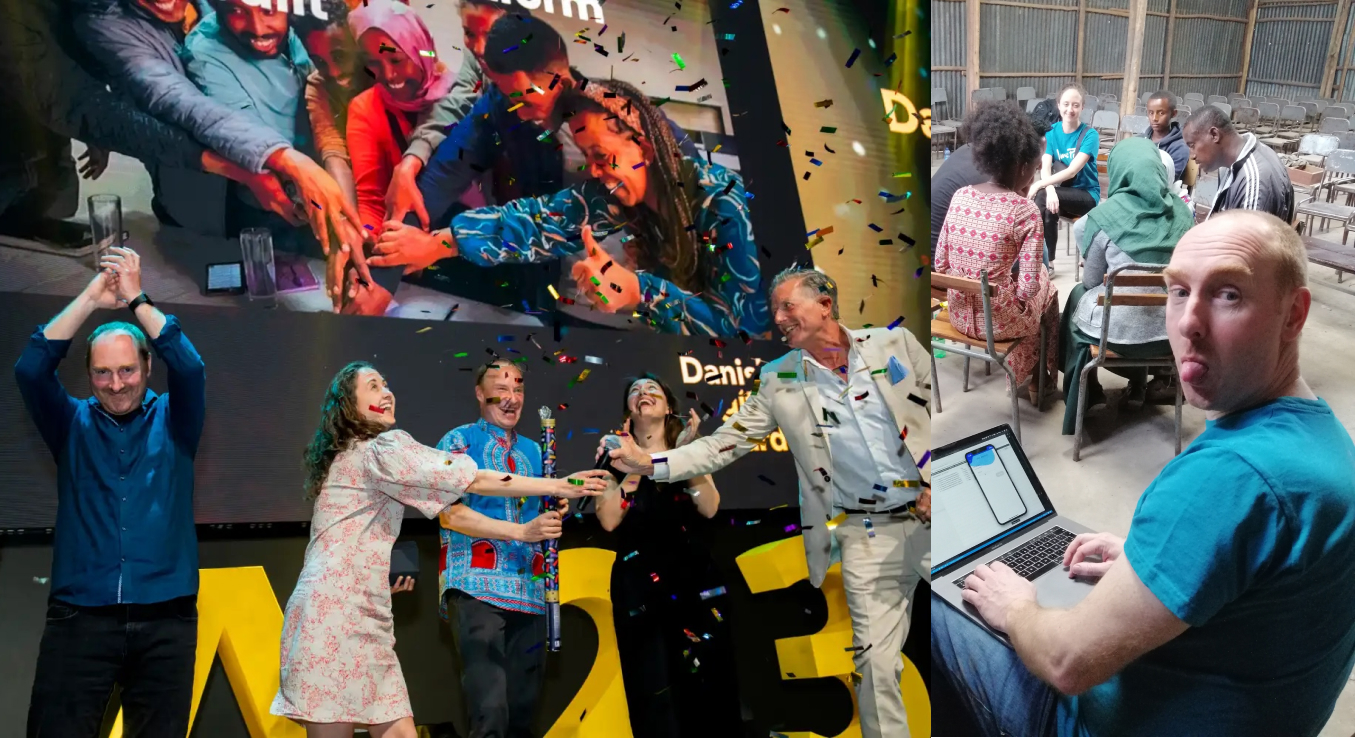Daniel Brøndum Torp and Jamii.one is on a mission to transform the lives of the Ethiopian people through bank loans and life insurance. About simple fintech and the huge impact it can have on low income communities in Ethiopia – provided there’s internet and cell phones…. Meet the dedicated man who makes the impact.
Who applies to a job because it sounds weird? Or TOO weird, actually.
Probably more than we expect – and one of them is right her in a private office at Republikken.!
Meet Daniel Brøndum Torp, CTO and co-founder of Jamii.one – a fintech company that aims to be a digital link between different communities and financial services, e.g. (life)insurance or loans.
Where? In Ethiopia and Kenya in East Africa! Where everything usually is done on paper.
At this weeks Community Breakfast Daniel shared the story of Jamii.one, the obstacles and the wins. And made us realise that although we, in Denmark, at first glance don’t have much in common with the two countries, Denmark has actually had similar communities. Communities that are the basis of Jamii.one’s existence.
Coming from a completely different background, working in big corporate companies, Daniel stil cannot exactly pinpoint what it is that made him jump onboard the Jamii.one project. But he’s still here and he’s changing East Africa, group by group, community by community.
The Groups in the Communities
Let’s focus on Ethiopia.
The East African country has 120 million people spread over a vast area. The primary part of the population has formed different types of groups consisting of up to 1000 or 2000 people. They usually meet once a month and pay an amount that is then kept by a group leader.
If a family member dies, the family gets money and the funeral is taken care of by everyone in the group. Some of the money is spent on buying houses (for funeral events), tables, chairs, cups, everything necessary to handle situations like funerals or other events that makes a community come together.
And by providing a free digital platform, the local communities get access to keeping track of information and records- and eventually access to banks and bank loans.
Daniel Brøndum Torp knew nothing about these types of savings groups in Africa but he did recognise the same idea behind the groups, savings and “investments” (funerals) from Danish history and the Danish Andelskasse. However, times have changed in Denmark, and Andelskasserne are slowly disappearing with only around 30 left.
What’s in it for the Communities
No doubt it’s a big advantage welcome the digital revolution in regions where traditional paper-based systems prevail, this digital leap enables a more streamlined and efficient approach. The goal is to empower communities by bringing their financial activities into a digital realm.
But Jamii.one’s goal is not only to implement the free digital platform. It’s also to inform about the benefits of bank loans and insurances. In particular life insurance as absurd as it may seem.
Because how do you convince some one who can barely feed themselves to prioritise paying for a life insurance?
To Daniel Brøndum Torp it’s of course not that simple. Why pay for an insurance that you’ll never use, cause you’re dead? But once the primary provider of the family (the husband) understands that the insurance can actually provide a safety net and help the family survive, it makes sense.
As for the bank loans the story of a woman who in the aftermath of COVID19 had lost her lively hood. A small loan helped her set up a coffee shop, becoming financially independent in a matter of months. The bonus part? She could pay back her loan too.
Next step is health insurance, but one step at the time. One of them is as a matter of fact to make Jamii.one profitable too. Without money, their crucial work cannot continue.
The Challenges and Potential
However, implementing fintech in Ethiopia isn’t exactly a walk in the park.
The platform is not free for banks, insurance companies etc. which is difficult for some stakeholders to understand.
But that fee is helps Jamii.one exist – and is almost the smallest obstacle. Working in remote areas means poor internet connections and no cell phones – two fundamental parameters for using the platform – and low level of education.
Speaking of …. Daniel explained how the government sometimes even shuts down the internet nationwide for weeks because of school exams or other unknown reasons. Something that could be done locally therefore affects the country and any digital initiative in progress.
And w e shouldn’t forget inflation which plays an important role too in making bank loans and insurances attractive. Visualising the longterm benefits can be difficult if your money is worth nothing tomorrow and you just bought an insurance or put money in the bank.
And for the financial institutions the problem is that they have to adjust the payment too. To accommodate this challenge, you can only buy an insurance for one year at a time.
One question is furthermore why a financial institution would even choose to collaborate with Jamii.one in regions where access to financial services is limited.
The answer could be the untapped potential of these markets. With less than 10% of the population connected to financial services, Ethiopia presents a vast opportunity. However, the challenges are manifold, including a lack of IDs and credit history.
Jamii.one’s digital platform, developed by Daniel Brøndum Torp, not only addresses these challenges but also provides valuable data for risk assessment, making these untapped markets more attractive for financial institutions.
Daniel Brøndum Torp and Jamii.one in Ethiopia
Furthermore, Jamii.one has the advantage that they – and not the financial institutions – have a good connection to the local population.
By employing locals instead of dispatching Danish staff, Jamii.one is also very much aware of the impact that detail has – that they add jobs and the can make use of the local staff’s knowledge about culture and history.
And by working closely with the association of regional councils and groups “National Iddir Coalition Council”, Jamii.one has even better access to understanding the potential market and creating collaborations with more communities and groups.
Plus, as Daniel Brøndum Torp says, it’s hard work to approach the market. It goes without saying that since only 10% of the population is digitally reachable, all contact is done by knocking doors down. And banks and insurance companies don’t have that capacity.
Today Jamii.one is approaching 1.000.000 users of their digital platform. And that’s a big win despite the long way to 120 million nationwide 🙂
The aim is a million more within the next year.
We root for you and the people of Ethiopia – and Kenya too!
Daniel, good thing you can take a breather with your team and co-founder, Charlotte Rønje (the one who wrote the weird job post that Daniel responded to) in your office here at Republikken.
We know Charlotte wanted to save the world when you first met and founded Jamii.one, and we are proud that philanthropic ideas come to life within the walls of Republikken.
We do believe that when it rains on the priest, it dribbles on the bellringer. So dribble away! We sure did get inspired by the work you put into changing the lives of others on this Thursday morning.
Check out the Jamii.one crowdfunding video here
It gives an overall explanation to the reasons for Jamii.one to do the work they do.
Check out the Jamii.one website here

